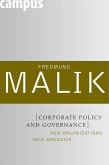Fredmund Malik has become the leading analyst of, and expert on Management in Europe (...). He is a commanding figure - in theory as well as in the practice of Management. Peter Drucker Man-made organizations such as businesses and other societal institutions can function autodynamically, in the same way as modern technology steers, regulates and controls itself. With this book, Fredmund Malik offers insight into his cybernetic toolkit, along with instructions for its use. General systems policy and master controls are the key functions of future corporate policy and corporate governance. Fredmund Malik shows how organizations have to be organized so they can subsequently organize themselves. With this book series he presents his cybernetic general management system for the age of complexity. "With this book, Malik lives up to his reputation as a mastermind." Financial Times Deutschland
Dieser Download kann aus rechtlichen Gründen nur mit Rechnungsadresse in A, B, BG, CY, CZ, D, DK, EW, E, FIN, F, GR, HR, H, IRL, I, LT, L, LR, M, NL, PL, P, R, S, SLO, SK ausgeliefert werden.









